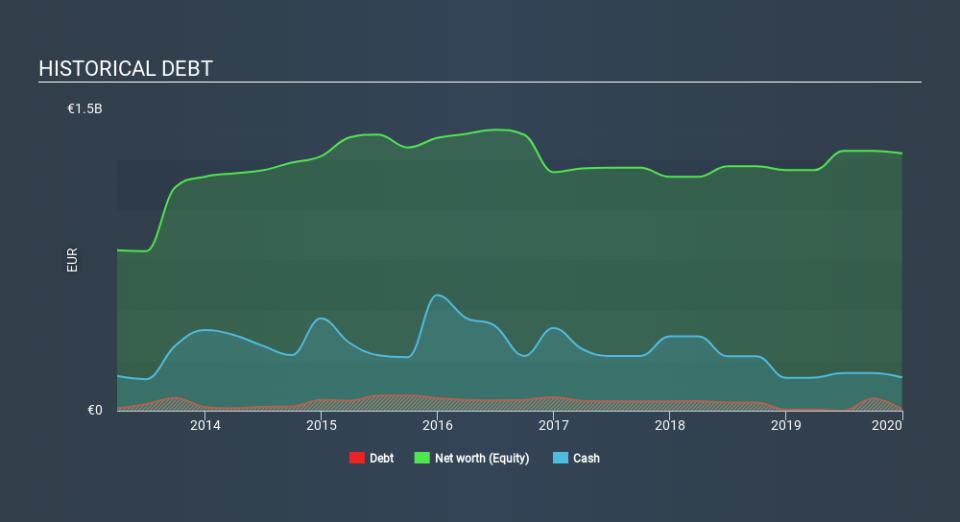Is DMG MORI (ETR:GIL) A Risky Investment?

Howard Marks put it nicely when he said that, rather than worrying about share price volatility, 'The possibility of permanent loss is the risk I worry about... and every practical investor I know worries about. So it might be obvious that you need to consider debt, when you think about how risky any given stock is, because too much debt can sink a company. Importantly, DMG MORI AKTIENGESELLSCHAFT (ETR:GIL) does carry debt. But the real question is whether this debt is making the company risky.
Why Does Debt Bring Risk?
Debt assists a business until the business has trouble paying it off, either with new capital or with free cash flow. If things get really bad, the lenders can take control of the business. While that is not too common, we often do see indebted companies permanently diluting shareholders because lenders force them to raise capital at a distressed price. Having said that, the most common situation is where a company manages its debt reasonably well - and to its own advantage. The first thing to do when considering how much debt a business uses is to look at its cash and debt together.
Check out our latest analysis for DMG MORI
What Is DMG MORI's Net Debt?
You can click the graphic below for the historical numbers, but it shows that as of December 2019 DMG MORI had €7.74m of debt, an increase on €5.14m, over one year. However, it does have €166.4m in cash offsetting this, leading to net cash of €158.6m.
How Healthy Is DMG MORI's Balance Sheet?
We can see from the most recent balance sheet that DMG MORI had liabilities of €1.04b falling due within a year, and liabilities of €147.7m due beyond that. Offsetting these obligations, it had cash of €166.4m as well as receivables valued at €723.9m due within 12 months. So it has liabilities totalling €297.9m more than its cash and near-term receivables, combined.
Given DMG MORI has a market capitalization of €3.19b, it's hard to believe these liabilities pose much threat. Having said that, it's clear that we should continue to monitor its balance sheet, lest it change for the worse. While it does have liabilities worth noting, DMG MORI also has more cash than debt, so we're pretty confident it can manage its debt safely.
DMG MORI's EBIT was pretty flat over the last year, but that shouldn't be an issue given the it doesn't have a lot of debt. The balance sheet is clearly the area to focus on when you are analysing debt. But you can't view debt in total isolation; since DMG MORI will need earnings to service that debt. So if you're keen to discover more about its earnings, it might be worth checking out this graph of its long term earnings trend.
Finally, a company can only pay off debt with cold hard cash, not accounting profits. DMG MORI may have net cash on the balance sheet, but it is still interesting to look at how well the business converts its earnings before interest and tax (EBIT) to free cash flow, because that will influence both its need for, and its capacity to manage debt. Over the most recent three years, DMG MORI recorded free cash flow worth 68% of its EBIT, which is around normal, given free cash flow excludes interest and tax. This free cash flow puts the company in a good position to pay down debt, when appropriate.
Summing up
We could understand if investors are concerned about DMG MORI's liabilities, but we can be reassured by the fact it has has net cash of €158.6m. And it impressed us with free cash flow of €137m, being 68% of its EBIT. So is DMG MORI's debt a risk? It doesn't seem so to us. Above most other metrics, we think its important to track how fast earnings per share is growing, if at all. If you've also come to that realization, you're in luck, because today you can view this interactive graph of DMG MORI's earnings per share history for free.
If you're interested in investing in businesses that can grow profits without the burden of debt, then check out this free list of growing businesses that have net cash on the balance sheet.
If you spot an error that warrants correction, please contact the editor at editorial-team@simplywallst.com. This article by Simply Wall St is general in nature. It does not constitute a recommendation to buy or sell any stock, and does not take account of your objectives, or your financial situation. Simply Wall St has no position in the stocks mentioned.
We aim to bring you long-term focused research analysis driven by fundamental data. Note that our analysis may not factor in the latest price-sensitive company announcements or qualitative material. Thank you for reading.

